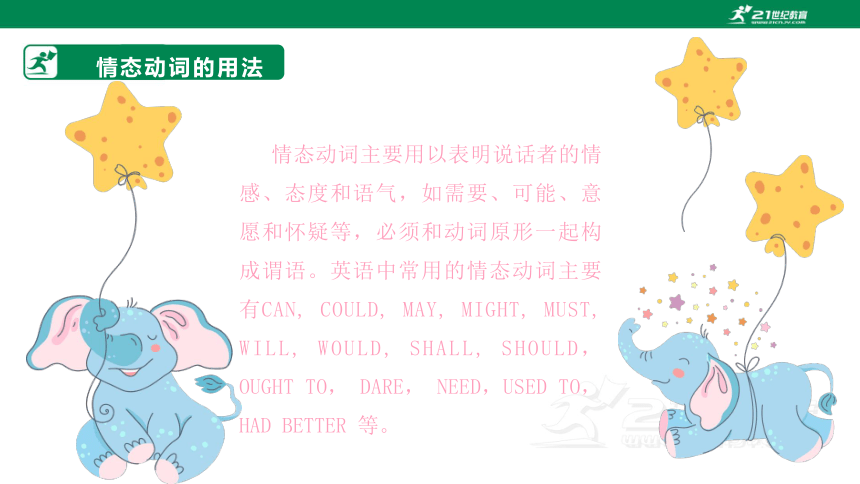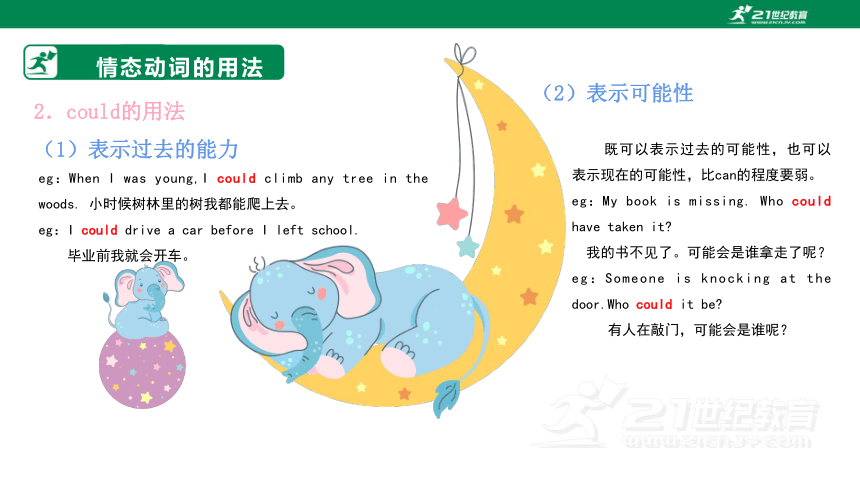【备考2023】英语 高考语法专项复习 情态动词 课件( 66页PPT)
文档属性
| 名称 | 【备考2023】英语 高考语法专项复习 情态动词 课件( 66页PPT) |  | |
| 格式 | zip | ||
| 文件大小 | 2.1MB | ||
| 资源类型 | 试卷 | ||
| 版本资源 | 通用版 | ||
| 科目 | 英语 | ||
| 更新时间 | 2023-01-31 09:57:46 | ||
图片预览












文档简介
(共66张PPT)
情态动词
【备考2023】高考专项语法
目 录
CONTENTS
目录
03
01
02
情态动词的用法
情态动词后接完成式的用法
the usage of modal verbs
the use of modal verbs followed by the perfect form
课后练习
practice
情态动词的用法
情态动词的用法
the usage of modal verbs
01
the usage of modal verbs
情态动词的用法
情态动词主要用以表明说话者的情感、态度和语气,如需要、可能、意愿和怀疑等,必须和动词原形一起构成谓语。英语中常用的情态动词主要有can, could, may, might, must, will, would, shall, should, ought to, dare, need,used to,had better 等。
情态动词的用法
eg:Most of the young people can use the computer now.
现在大多数年轻人都会使用电脑。
eg:Everyone here can speak English.
这儿人人会说英语。
1. can的用法
(1) 表示能力
情态动词的用法
eg:Can you come tomorrow?明天你能来吗?
eg:I can call you tomorrow.
我可以明天给你打电话。
1. can的用法
(2)表示客观条件允许做某事
情态动词的用法
eg:Scotland can be very cold.
苏格兰有时会很冷。
eg:Jim can be very annoying.
吉姆有时候会很烦人。
1. can的用法
(3)表示偶尔发生的情况
情态动词的用法
eg:The man can't be Mr. Smith. He has gone abroad.
那个人不可能是史密斯先生。他已经出国了。
eg:You can't be serious.你不会当真吧?
1. can的用法
(4)表示推测,往往用于否定句或疑问句
情态动词的用法
eg:You can finish the work tomorrow.
你可以明天完成这项工作。
eg:You can't make so much noise.
你不能弄出这么大的噪音。
1. can的用法
(5)表示“允许(做某事)”,与may的意思差不多在日常口语中常用can
情态动词的用法
eg:How can you believe in such a person
你怎么会信任这样一个人?
eg:Did she quit the job It can't be true!
她辞掉那个工作了吗?那不会是真的!
1. can的用法
(6)表示“惊讶”,常用于疑问句、否定句
情态动词的用法
can't help doing sth. 情不自禁做某事
can't help but do sth.情不自禁做某事
can but do sth. 只好做某事
cannot...too/enough无论怎么……也不为过
eg:I can't help but admire your courage.
我不得不钦佩你的勇气。
eg:You cannot be careful enough to cross the road. 过马路时怎么小心都不为过。
1. can的用法
(7)can的习惯用法
情态动词的用法
eg:When I was young,I could climb any tree in the woods. 小时候树林里的树我都能爬上去。
eg:I could drive a car before I left school.
毕业前我就会开车。
2.could的用法
既可以表示过去的可能性,也可以表示现在的可能性,比can的程度要弱。
eg:My book is missing. Who could have taken it
我的书不见了。可能会是谁拿走了呢?eg:Someone is knocking at the door.Who could it be
有人在敲门,可能会是谁呢?
(1)表示过去的能力
(2)表示可能性
情态动词的用法
could表示现在,用以婉转地提出请求、想法、建议等。问答时用can。
2.could的用法
eg:-Could you show me the way?
你能告诉我怎么去吗?
-Yes,I can,可以。
eg:Could you please speak a little louder 请你大点声说好吗?
(3)表示有礼貌地请求或建议
情态动词的用法
此时常用于否定句、疑问句,表示现在的情况,与can相当。
eg:Could this be true?这可能是真的吗?
eg:How could you be so careless?你怎么会这么粗心呢?
2.could的用法
eg:I wish I could fly!
我如果能飞多好呀!
eg:If I were you,I could pass the test. 如果我是你,我就能通过考试。
(4)表示“惊异”“不相信”
(5)用于虚拟语气句子中
情态动词的用法
eg:-May I drive the car?我可以开这辆车吗?
-Yes,you may/can.是的,你可以。
-No,you can't./you'd better not./Please don't do it. 不,你不可以。
eg:You may not take photos in the museum.
博物馆内不准照相。
(1)表示请求,许可
3.may的用法
情态动词的用法
不用于问句中,表示的可能性比can小。
eg:He may be very busy now.他现在可能很忙。
eg:I heard the TV. Someone may be at home.
我听到电视声了,家里应该有人。
(2)表示可能性
3.may的用法
情态动词的用法
may表示祝愿时,常放于句首,句子用倒装。
eg:May you succeed!祝你成功!
eg:May you be happy!祝你幸福!
(3)表示祝愿
3.may的用法
情态动词的用法
eg:Open the window so that the fresh air may come through. 打开窗户让新鲜空气进来。
eg:Speak clearly so that they may understand you.
说得清楚些,以便他们明白你的意思。
(4)用于目的状语从句中
3.may的用法
情态动词的用法
此时指过去的许可。
eg:He was wondering if he might use the computer.
他想知道能否用一下电脑。
eg:He asked if he might go home,他问是否能回家。
(1)表示许可
4.might的用法
情态动词的用法
此时可以指过去的可能性,也可指现在的可能性,比may的可能性小,不用于问句中。
eg:He said that he might not be free that afternoon.
他说他那天下午可能没空。
eg:He might come tomorrow, but I am not quite sure.
他可能明天来,但我拿不准。
(2)表示可能性
4.might的用法
情态动词的用法
can表示一般性的或理论上的可能性,而不是要发生或正在发生的可能性;may表示实际发生的可能性。could和might意思差别很小,只是might的可能性比could小。
eg:I can take a bus to go to school, but I may walk tomorrow.
我可以坐公共汽车去上学,但明天我可能走着去。
eg:John could/may/might come this evening. 约翰今晚可能会来。
【拓展】1. may/might与can/could
4.might的用法
情态动词的用法
may not意为“可能不”,而 cannot/can't意为“不可能”。
eg:You may be right or may not be right.
你可能对也可能不对。
eg:The news can't be true.这消息不可能是真的。
【拓展】2.may not与cannot/can't的区别
4.might的用法
情态动词的用法
must 表示“必须”“一定要”之意,多指现在或将来的情况,强调说话人的主观语气。其否定式mustn't表示禁止。
eg:You must do everything as I do.
你必须按照我做的那样做所有的事情。
eg:Cars mustn't be parked in front of the entrance.
入口处禁止停放车辆。
5.must的用法
(1)表示必要性
情态动词的用法
这种用法多用来建议别人做某事或在否定句中指法规或形势决定不应发生某事。
eg:You really must see that film. It's wonderful.
你真该去看看那部电影,真是太棒了。
eg:This book mustn't be removed from the library.
这本书不得带出图书馆。
5.must的用法
(2)表示“应该”
情态动词的用法
此时常译为“一定是”“准是”,常指有根据、有把握地推测。这种用法只能用于肯定句。
eg:The light is on, so he must be at home.
灯亮着,所以他肯定在家。
eg:She is wearing a long face.She must be angry.
她脸拉得很长,准是生气了。
5.must的用法
(3)表示推测
情态动词的用法
eg:Why must it rain on Sunday
为什么偏偏在星期天下雨?
eg:Why must you do it?你为什么偏要做这件事?
5.must的用法
(4)表示“偏要,偏偏”,表示不希望的、不满的、挖苦和讽刺等感情
情态动词的用法
此时常用于口语中,表示说话者的坚定的态度。
eg:I must say, you're looking extremely well.
我得说你的气色看起来极好。
eg:I must admit, I was looking forward to it then.
我得承认,我当时一直在盼望着它。 【注】can,may,must用于口语中,must的语气最强。
5.must的用法
(5)表示强调
情态动词的用法
(1)表示“应该”
表示责任和义务,意为“应该,应当”。
eg:You should have checked the paper before you handed it in.在你交卷前,你应该检查一下试卷。
eg:Ought I to return all the books tomorrow
我明天得把所有的书都还上吗?
6.ought to与should的用法
情态动词的用法
(2)表示推测
表示说话者根据一定的依据进行推测,常译为“按道理说应该”。
eg:She ought to/should pass her chemistry final.
她应该能通过化学期末考试。
eg:Jeffrey ought to/should be there by now.
杰弗里现在应该在那里了。
6.ought to与should的用法
情态动词的用法
(3)should还可表示说话人的惊奇、愤怒、失望等情感
eg:Don't ask me. How should I know
不要问我,我怎么会知道?
eg:Why should you be so late today
你今天怎么来得这么晚?
6.ought to与should的用法
情态动词的用法
will表示现在的意愿,would用于过去的情况,也可表示现在的意愿,但语气比will更委婉。
eg:I'll do my best to help you.我愿尽力帮你。
eg:She said she would try her best to help me.
她说她愿意尽自己最大的努力来帮我。
7.will/would的用法
(1)表示意愿
情态动词的用法
主要用于第二人称作主语的疑问句中,would比will更客气、委婉
eg:Will you come in for a while 进来一会儿好吗?
eg:Would you please give me a piece of paper 能给我一张纸吗?
7.will/would的用法
(2)表示请求
情态动词的用法
eg:You will fail if you don't work hard.
不努力就注定要失败。
eg:You will regret if you waste yourtime.
浪费时间,你一定会后悔的。
7.will/would的用法
(3)will表示规律性的“注定会”
情态动词的用法
带有主观性,常译为“总是”
eg:Rosa will always be late for school.罗莎上学总是迟到。
eg:Mum would tell us stories before we went to bed.
(过去)在我们上床睡觉前,妈妈总是给我们讲故事。
7.will/would的用法
(4)表示习惯或特性
情态动词的用法
(1)征求对方意见或请求
主要用于第一、三人称的疑问句中
eg:What shall he do next?他下一步干什么呢?
eg:Shall we begin our class?我们开始上课好吗?
8.shall的用法
情态动词的用法
(2)表示承诺、警告、命令或威胁等
用于第二、三人称的陈述句中。
eg:You shall have a sweet if you behave well.
如果表现好的话,你就会得到一块糖。
eg:Rick shall be fined if he doesn't listen to the teacher.
里克如果不听老师的话会受到惩罚的。
8.shall的用法
情态动词的用法
(3)在条约、规定、法令等文件中表示义务或规定
用于第三人称的陈述句中,常译为“应该,必须”。
eg:No reader shall remove a book from the library without consent of the librarian.
非经管理员同意,读者不准把书带出图书馆。
eg:Students shall wear school uniforms in the school.
学生在学校应该穿校服。
8.shall的用法
情态动词的用法
9.need的用法
need作情态动词一般用于否定句和疑问句,不用于肯定句,过去式与原形一样。
(1)在否定句中,表示“不必”
eg:It's quite warm here; we needn't turn the heating on yet.
这里很暖和;我们还不需要开暖气。
eg:If you love fried chicken, you needn't give it up.如果你喜欢吃炸鸡,就没有必要戒掉。
情态动词的用法
9.need的用法
need作情态动词一般用于否定句和疑问句,不用于肯定句,过去式与原形一样。
(2)在疑问句及条件句中,表示“需要”
用在疑问句时,将need提至句首,其肯定回答用must,否定回答用needn't。
eg:-Need I come tomorrow?
我明天需要来吗?
-Yes,you must. / No, you needn't.
是的,你必须来。/不,没必要。
情态动词的用法
9.need的用法
need作情态动词一般用于否定句和疑问句,不用于肯定句,过去式与原形一样。
【拓展】
need作实义动词时,表示“需要”,后跟名词、代词、不定式、动名词等。作宾语的动名词用主动形式表示被动意义,与不定式的被动式意义相同。
eg:He needs to see a doctor right now. 他需要马上去看医生
eg:The windows need cleaning.
=The windows need to be cleaned. 窗户需要擦。
情态动词的用法
(1)用于否定句中,表示“不敢”
dare用作情态动词表示“敢”,主要用于否定句、疑问句、条件句。没有人称变化,但有过去式即dared。
10.dare的用法
eg:He dare not dosuch a thing.他不敢做这样的事。
eg:No one dared speak of it.没人敢提这件事。
情态动词的用法
(2)用于疑问句及条件句,表示“敢”
dare用作情态动词表示“敢”,主要用于否定句、疑问句、条件句。没有人称变化,但有过去式即dared。
10.dare的用法
eg:How dare you say I'm unfair?你怎么敢说我不公平?
eg:If you dare speak to me like that again, you will be sorry.如果你再敢那样对我说话,你会后悔的。
情态动词的用法
【拓展】
dare用作情态动词表示“敢”,主要用于否定句、疑问句、条件句。没有人称变化,但有过去式即dared。
10.dare的用法
dare作实义动词,后跟不定式。在否定句和疑问句中,不定式符号to可以省略。
eg:I do not dare (to) complain. (=I dare not complain.)
我不敢抱怨。
eg:Do you dare (to) jump into the water from here
=Dare you jump into the water from here
你敢从这儿跳进水里吗?
情态动词的用法
eg:People used to believe that the earth was flat.
过去人们认为地球是扁平的。eg:The shops usedn't/didn't use to open on Sundays.这些商店过去在星期天是不营业的。
eg:Used you to/Did you use to be friends
你们以前是朋友吗?
表示“过去常常,(现在并不如此)”,没有人称和数的变化。可以与表示过去的时间状语连用。其否定形式为 usedn't to 或 didn't use to。其一般疑问句形式是将used提到主语前或用“Did...useto...?”的结构。
11.used to的用法
情态动词的用法
eg:We used to write to each other every other week.我们以前每隔一周就给对方写一次信。
eg:We used to be workmates.
我们以前是同事。
eg:I would go to swim in this river.我以前常在这条河里游泳。
二者都表示过去的习惯。used to 既可指动作也可指状态,强调现在已不发生或存在;would仅指动作,而且不说明现在的情况如何,这种动作现在可能还发生,也可能不发生了。
【拓展】used to与would的区别
情态动词的用法
had better 后跟动词原形,表示“最好……”,其否定式在had better后加 not。
eg:You had better do some research.
你最好做些研究。
eg:You had better not go there by plane.
你最好不要乘飞机去那里。
12.had better的用法
情态动词的用法
13.have to的用法
have to的意思接近 must,但 must更强调说话者的主观意愿;have to强调客观上的必要性,常译为“不得不”。
must与have to的否定式表示的意义完全不同,mustn't意为“不许,不可以”,not have to意为“不必”。eg:The last bus left, and he had to walk home.
最后一班车走了,他只好步行回家。
eg:We don't have to hurry, for there's plenty of time. 我们不必着急,因为时间很充裕。
情态动词的用法
eg:I am not able to answer your question.
我回答不了你的问题。
eg:Are you able to type (=Can you type )
你会打字吗?
eg:He wasn't able to/couldn't understand the true meaning of life. 他当时不能理解生活的真正意义。
【注】be able to 强调经过意志努力才能有的能力,而can仅表示客观上有某种能力。
(1) be able to后跟动词原形,表示具体的能力,与can的用法相近
14.be able to的用法
情态动词的用法
was/were able to表示过去成功地做成了某事,could 仅表示客观上有某种能力,不说明实施该能力后的结果。
eg:The fire was very big, but most people were able to escape from it.
那场火很大,但大多数人从火中逃了出来。
eg:By the time she was eight, she could read Greek and Latin. 她八岁就会读希腊文和拉丁文了。
(2)was/were able to与could的区别
14.be able to的用法
情态动词的用法
eg:The baby will be able to walk in a few weeks.
几周后这个婴儿就会走路了。
eg:I'm sorry I haven't been able to answer your letter in time. 很抱歉我没能及时给你回信。
(3) be able to有更多的时态形式
14.be able to的用法
情态动词的用法
eg:He might be able to fix your car.
他可以修理你的汽车。
eg:I want her to be able to use a computer.
我希望她能使用电脑。
(4) be able to 可用在 may/might,want 等动词后
14.be able to的用法
情态动词后接完成式的用法
情态动词后接完成式的用法
the use of modal followed by the perfect form
02
the use of modal verbs followed by the perfect form
情态动词后接完成式的用法
can,could,may,might,must后接完成式表示对过去情况的推测;may,might,could,should, need后接完成式表示虚拟语气。
情态动词后接完成式的用法
must have done 表示对过去发生的事情或状态进行推测,语气比较肯定,通常只用于肯定句.
eg:Look at his new car. He must have earned a lot of money.看他的新车。他肯定赚了许多钱。
eg:He must have known what she wanted.他一定早知道她想要什么了。
1.must have done的用法
情态动词后接完成式的用法
may/might have done 主要用在肯定句和否定句中表示对已发生的动作或存在的状态进行不肯定的推测,might的语气比may弱。might have done还可表示过去可能发生但实际没发生。
eg:That was too dangerous.You might have killed yourself.
那太危险了,你差点就丧命了。
eg:He might not have settled the problem.他可能尚未解决这个问题。
2.may/might have done的用法
情态动词后接完成式的用法
表示对过去某种情况的怀疑或不确定,一般用于否定句和疑问句,could的语气较can弱。couldhave done 还可表示过去本来可以做的事而没做。
eg:He can't have taken it home.他不可能把它带回家了。
eg:He couldn't have finished so much work in so short
a time. 他不可能在这么短的时间内完成如此多的工作。
eg:We could have gone there on foot and a taxi wasn't necessary at all.
本来我们可以走着去那儿,根本没必要乘出租车。
3.can/could have done的用法
情态动词后接完成式的用法
ought to/should have done 表示过去本应做某事但没做,其否定式表示过去不该做某事但做了。有不满或责备之意,其中ought to的语气比should强烈。
4.ought to/should have done的用法
eg:You ought to/should have studied harder.
你本应该更努力学习的。
eg:He oughtn't to/shouldn't have done that.他本来就不该做那件事。
情态动词后接完成式的用法
needn't have done表示过去做了不必做的事情。
eg:You needn't have gone to school yesterday.
你昨天本来不需要去学校。
eg:I needn't have taken the umbrella, for the weather is fine. 天气这么好,我本没必要带雨伞的。
5. needn't have done的用法
课后练习
课后练习
practice
03
practice
课后练习
1
2
3
I love the weekend,because I __________ get up early on Saturdays and Sundays.
语法填空
语法填空
语法填空
It was really annoying; I __________ get access to the data bank you had recommended.
One of our rules is that every student __________ wear school uniform while at school.
课后练习
4
5
6
I've ordered some pizza,so we __________ worry about cooking when we get home tired.
语法填空
语法填空
语法填空
It was sad to me that they,so poor themselves,__________ bring me food.
No one __________ be more generous;he has a heart of gold.
课后练习
7
8
-Can't you stay a little longer?-It's getting late. I really __________ go now.My daughter is home alone.
语法填空
语法填空
语法填空
It was so noisy that we __________ hear ourselves speak.
课后练习
1
2
3
根据句意,此处应填needn't表示不必。
参考答案
参考答案
参考答案
根据 It was really annoying 可知应用couldn't。
shall用于第三人称的陈述句中用来介绍条约、法令等文件中的规定。。
needn't
couldn't
shall
课后练习
4
5
6
本题考查情态动词。根据句意可知答案为 needn't。
参考答案
参考答案
参考答案
本题考查情态动词。情态动词should可以表示说话人惊讶的语气,意为“竟然”。
can't/couldn't...more表示最高级的意思。no one本身就表示否定,故用 can/could的肯定形式。
needn't
should
could/can
课后练习
7
8
本题考查情态动词。根据上下文,答案为must(必须)。
参考答案
参考答案
参考答案
根据语境可知此处表达过去的能力故用couldn't。
must
couldn't
谢谢
21世纪教育网(www.21cnjy.com)
中小学教育资源网站
兼职招聘:
https://www.21cnjy.com/recruitment/home/admin
情态动词
【备考2023】高考专项语法
目 录
CONTENTS
目录
03
01
02
情态动词的用法
情态动词后接完成式的用法
the usage of modal verbs
the use of modal verbs followed by the perfect form
课后练习
practice
情态动词的用法
情态动词的用法
the usage of modal verbs
01
the usage of modal verbs
情态动词的用法
情态动词主要用以表明说话者的情感、态度和语气,如需要、可能、意愿和怀疑等,必须和动词原形一起构成谓语。英语中常用的情态动词主要有can, could, may, might, must, will, would, shall, should, ought to, dare, need,used to,had better 等。
情态动词的用法
eg:Most of the young people can use the computer now.
现在大多数年轻人都会使用电脑。
eg:Everyone here can speak English.
这儿人人会说英语。
1. can的用法
(1) 表示能力
情态动词的用法
eg:Can you come tomorrow?明天你能来吗?
eg:I can call you tomorrow.
我可以明天给你打电话。
1. can的用法
(2)表示客观条件允许做某事
情态动词的用法
eg:Scotland can be very cold.
苏格兰有时会很冷。
eg:Jim can be very annoying.
吉姆有时候会很烦人。
1. can的用法
(3)表示偶尔发生的情况
情态动词的用法
eg:The man can't be Mr. Smith. He has gone abroad.
那个人不可能是史密斯先生。他已经出国了。
eg:You can't be serious.你不会当真吧?
1. can的用法
(4)表示推测,往往用于否定句或疑问句
情态动词的用法
eg:You can finish the work tomorrow.
你可以明天完成这项工作。
eg:You can't make so much noise.
你不能弄出这么大的噪音。
1. can的用法
(5)表示“允许(做某事)”,与may的意思差不多在日常口语中常用can
情态动词的用法
eg:How can you believe in such a person
你怎么会信任这样一个人?
eg:Did she quit the job It can't be true!
她辞掉那个工作了吗?那不会是真的!
1. can的用法
(6)表示“惊讶”,常用于疑问句、否定句
情态动词的用法
can't help doing sth. 情不自禁做某事
can't help but do sth.情不自禁做某事
can but do sth. 只好做某事
cannot...too/enough无论怎么……也不为过
eg:I can't help but admire your courage.
我不得不钦佩你的勇气。
eg:You cannot be careful enough to cross the road. 过马路时怎么小心都不为过。
1. can的用法
(7)can的习惯用法
情态动词的用法
eg:When I was young,I could climb any tree in the woods. 小时候树林里的树我都能爬上去。
eg:I could drive a car before I left school.
毕业前我就会开车。
2.could的用法
既可以表示过去的可能性,也可以表示现在的可能性,比can的程度要弱。
eg:My book is missing. Who could have taken it
我的书不见了。可能会是谁拿走了呢?eg:Someone is knocking at the door.Who could it be
有人在敲门,可能会是谁呢?
(1)表示过去的能力
(2)表示可能性
情态动词的用法
could表示现在,用以婉转地提出请求、想法、建议等。问答时用can。
2.could的用法
eg:-Could you show me the way?
你能告诉我怎么去吗?
-Yes,I can,可以。
eg:Could you please speak a little louder 请你大点声说好吗?
(3)表示有礼貌地请求或建议
情态动词的用法
此时常用于否定句、疑问句,表示现在的情况,与can相当。
eg:Could this be true?这可能是真的吗?
eg:How could you be so careless?你怎么会这么粗心呢?
2.could的用法
eg:I wish I could fly!
我如果能飞多好呀!
eg:If I were you,I could pass the test. 如果我是你,我就能通过考试。
(4)表示“惊异”“不相信”
(5)用于虚拟语气句子中
情态动词的用法
eg:-May I drive the car?我可以开这辆车吗?
-Yes,you may/can.是的,你可以。
-No,you can't./you'd better not./Please don't do it. 不,你不可以。
eg:You may not take photos in the museum.
博物馆内不准照相。
(1)表示请求,许可
3.may的用法
情态动词的用法
不用于问句中,表示的可能性比can小。
eg:He may be very busy now.他现在可能很忙。
eg:I heard the TV. Someone may be at home.
我听到电视声了,家里应该有人。
(2)表示可能性
3.may的用法
情态动词的用法
may表示祝愿时,常放于句首,句子用倒装。
eg:May you succeed!祝你成功!
eg:May you be happy!祝你幸福!
(3)表示祝愿
3.may的用法
情态动词的用法
eg:Open the window so that the fresh air may come through. 打开窗户让新鲜空气进来。
eg:Speak clearly so that they may understand you.
说得清楚些,以便他们明白你的意思。
(4)用于目的状语从句中
3.may的用法
情态动词的用法
此时指过去的许可。
eg:He was wondering if he might use the computer.
他想知道能否用一下电脑。
eg:He asked if he might go home,他问是否能回家。
(1)表示许可
4.might的用法
情态动词的用法
此时可以指过去的可能性,也可指现在的可能性,比may的可能性小,不用于问句中。
eg:He said that he might not be free that afternoon.
他说他那天下午可能没空。
eg:He might come tomorrow, but I am not quite sure.
他可能明天来,但我拿不准。
(2)表示可能性
4.might的用法
情态动词的用法
can表示一般性的或理论上的可能性,而不是要发生或正在发生的可能性;may表示实际发生的可能性。could和might意思差别很小,只是might的可能性比could小。
eg:I can take a bus to go to school, but I may walk tomorrow.
我可以坐公共汽车去上学,但明天我可能走着去。
eg:John could/may/might come this evening. 约翰今晚可能会来。
【拓展】1. may/might与can/could
4.might的用法
情态动词的用法
may not意为“可能不”,而 cannot/can't意为“不可能”。
eg:You may be right or may not be right.
你可能对也可能不对。
eg:The news can't be true.这消息不可能是真的。
【拓展】2.may not与cannot/can't的区别
4.might的用法
情态动词的用法
must 表示“必须”“一定要”之意,多指现在或将来的情况,强调说话人的主观语气。其否定式mustn't表示禁止。
eg:You must do everything as I do.
你必须按照我做的那样做所有的事情。
eg:Cars mustn't be parked in front of the entrance.
入口处禁止停放车辆。
5.must的用法
(1)表示必要性
情态动词的用法
这种用法多用来建议别人做某事或在否定句中指法规或形势决定不应发生某事。
eg:You really must see that film. It's wonderful.
你真该去看看那部电影,真是太棒了。
eg:This book mustn't be removed from the library.
这本书不得带出图书馆。
5.must的用法
(2)表示“应该”
情态动词的用法
此时常译为“一定是”“准是”,常指有根据、有把握地推测。这种用法只能用于肯定句。
eg:The light is on, so he must be at home.
灯亮着,所以他肯定在家。
eg:She is wearing a long face.She must be angry.
她脸拉得很长,准是生气了。
5.must的用法
(3)表示推测
情态动词的用法
eg:Why must it rain on Sunday
为什么偏偏在星期天下雨?
eg:Why must you do it?你为什么偏要做这件事?
5.must的用法
(4)表示“偏要,偏偏”,表示不希望的、不满的、挖苦和讽刺等感情
情态动词的用法
此时常用于口语中,表示说话者的坚定的态度。
eg:I must say, you're looking extremely well.
我得说你的气色看起来极好。
eg:I must admit, I was looking forward to it then.
我得承认,我当时一直在盼望着它。 【注】can,may,must用于口语中,must的语气最强。
5.must的用法
(5)表示强调
情态动词的用法
(1)表示“应该”
表示责任和义务,意为“应该,应当”。
eg:You should have checked the paper before you handed it in.在你交卷前,你应该检查一下试卷。
eg:Ought I to return all the books tomorrow
我明天得把所有的书都还上吗?
6.ought to与should的用法
情态动词的用法
(2)表示推测
表示说话者根据一定的依据进行推测,常译为“按道理说应该”。
eg:She ought to/should pass her chemistry final.
她应该能通过化学期末考试。
eg:Jeffrey ought to/should be there by now.
杰弗里现在应该在那里了。
6.ought to与should的用法
情态动词的用法
(3)should还可表示说话人的惊奇、愤怒、失望等情感
eg:Don't ask me. How should I know
不要问我,我怎么会知道?
eg:Why should you be so late today
你今天怎么来得这么晚?
6.ought to与should的用法
情态动词的用法
will表示现在的意愿,would用于过去的情况,也可表示现在的意愿,但语气比will更委婉。
eg:I'll do my best to help you.我愿尽力帮你。
eg:She said she would try her best to help me.
她说她愿意尽自己最大的努力来帮我。
7.will/would的用法
(1)表示意愿
情态动词的用法
主要用于第二人称作主语的疑问句中,would比will更客气、委婉
eg:Will you come in for a while 进来一会儿好吗?
eg:Would you please give me a piece of paper 能给我一张纸吗?
7.will/would的用法
(2)表示请求
情态动词的用法
eg:You will fail if you don't work hard.
不努力就注定要失败。
eg:You will regret if you waste yourtime.
浪费时间,你一定会后悔的。
7.will/would的用法
(3)will表示规律性的“注定会”
情态动词的用法
带有主观性,常译为“总是”
eg:Rosa will always be late for school.罗莎上学总是迟到。
eg:Mum would tell us stories before we went to bed.
(过去)在我们上床睡觉前,妈妈总是给我们讲故事。
7.will/would的用法
(4)表示习惯或特性
情态动词的用法
(1)征求对方意见或请求
主要用于第一、三人称的疑问句中
eg:What shall he do next?他下一步干什么呢?
eg:Shall we begin our class?我们开始上课好吗?
8.shall的用法
情态动词的用法
(2)表示承诺、警告、命令或威胁等
用于第二、三人称的陈述句中。
eg:You shall have a sweet if you behave well.
如果表现好的话,你就会得到一块糖。
eg:Rick shall be fined if he doesn't listen to the teacher.
里克如果不听老师的话会受到惩罚的。
8.shall的用法
情态动词的用法
(3)在条约、规定、法令等文件中表示义务或规定
用于第三人称的陈述句中,常译为“应该,必须”。
eg:No reader shall remove a book from the library without consent of the librarian.
非经管理员同意,读者不准把书带出图书馆。
eg:Students shall wear school uniforms in the school.
学生在学校应该穿校服。
8.shall的用法
情态动词的用法
9.need的用法
need作情态动词一般用于否定句和疑问句,不用于肯定句,过去式与原形一样。
(1)在否定句中,表示“不必”
eg:It's quite warm here; we needn't turn the heating on yet.
这里很暖和;我们还不需要开暖气。
eg:If you love fried chicken, you needn't give it up.如果你喜欢吃炸鸡,就没有必要戒掉。
情态动词的用法
9.need的用法
need作情态动词一般用于否定句和疑问句,不用于肯定句,过去式与原形一样。
(2)在疑问句及条件句中,表示“需要”
用在疑问句时,将need提至句首,其肯定回答用must,否定回答用needn't。
eg:-Need I come tomorrow?
我明天需要来吗?
-Yes,you must. / No, you needn't.
是的,你必须来。/不,没必要。
情态动词的用法
9.need的用法
need作情态动词一般用于否定句和疑问句,不用于肯定句,过去式与原形一样。
【拓展】
need作实义动词时,表示“需要”,后跟名词、代词、不定式、动名词等。作宾语的动名词用主动形式表示被动意义,与不定式的被动式意义相同。
eg:He needs to see a doctor right now. 他需要马上去看医生
eg:The windows need cleaning.
=The windows need to be cleaned. 窗户需要擦。
情态动词的用法
(1)用于否定句中,表示“不敢”
dare用作情态动词表示“敢”,主要用于否定句、疑问句、条件句。没有人称变化,但有过去式即dared。
10.dare的用法
eg:He dare not dosuch a thing.他不敢做这样的事。
eg:No one dared speak of it.没人敢提这件事。
情态动词的用法
(2)用于疑问句及条件句,表示“敢”
dare用作情态动词表示“敢”,主要用于否定句、疑问句、条件句。没有人称变化,但有过去式即dared。
10.dare的用法
eg:How dare you say I'm unfair?你怎么敢说我不公平?
eg:If you dare speak to me like that again, you will be sorry.如果你再敢那样对我说话,你会后悔的。
情态动词的用法
【拓展】
dare用作情态动词表示“敢”,主要用于否定句、疑问句、条件句。没有人称变化,但有过去式即dared。
10.dare的用法
dare作实义动词,后跟不定式。在否定句和疑问句中,不定式符号to可以省略。
eg:I do not dare (to) complain. (=I dare not complain.)
我不敢抱怨。
eg:Do you dare (to) jump into the water from here
=Dare you jump into the water from here
你敢从这儿跳进水里吗?
情态动词的用法
eg:People used to believe that the earth was flat.
过去人们认为地球是扁平的。eg:The shops usedn't/didn't use to open on Sundays.这些商店过去在星期天是不营业的。
eg:Used you to/Did you use to be friends
你们以前是朋友吗?
表示“过去常常,(现在并不如此)”,没有人称和数的变化。可以与表示过去的时间状语连用。其否定形式为 usedn't to 或 didn't use to。其一般疑问句形式是将used提到主语前或用“Did...useto...?”的结构。
11.used to的用法
情态动词的用法
eg:We used to write to each other every other week.我们以前每隔一周就给对方写一次信。
eg:We used to be workmates.
我们以前是同事。
eg:I would go to swim in this river.我以前常在这条河里游泳。
二者都表示过去的习惯。used to 既可指动作也可指状态,强调现在已不发生或存在;would仅指动作,而且不说明现在的情况如何,这种动作现在可能还发生,也可能不发生了。
【拓展】used to与would的区别
情态动词的用法
had better 后跟动词原形,表示“最好……”,其否定式在had better后加 not。
eg:You had better do some research.
你最好做些研究。
eg:You had better not go there by plane.
你最好不要乘飞机去那里。
12.had better的用法
情态动词的用法
13.have to的用法
have to的意思接近 must,但 must更强调说话者的主观意愿;have to强调客观上的必要性,常译为“不得不”。
must与have to的否定式表示的意义完全不同,mustn't意为“不许,不可以”,not have to意为“不必”。eg:The last bus left, and he had to walk home.
最后一班车走了,他只好步行回家。
eg:We don't have to hurry, for there's plenty of time. 我们不必着急,因为时间很充裕。
情态动词的用法
eg:I am not able to answer your question.
我回答不了你的问题。
eg:Are you able to type (=Can you type )
你会打字吗?
eg:He wasn't able to/couldn't understand the true meaning of life. 他当时不能理解生活的真正意义。
【注】be able to 强调经过意志努力才能有的能力,而can仅表示客观上有某种能力。
(1) be able to后跟动词原形,表示具体的能力,与can的用法相近
14.be able to的用法
情态动词的用法
was/were able to表示过去成功地做成了某事,could 仅表示客观上有某种能力,不说明实施该能力后的结果。
eg:The fire was very big, but most people were able to escape from it.
那场火很大,但大多数人从火中逃了出来。
eg:By the time she was eight, she could read Greek and Latin. 她八岁就会读希腊文和拉丁文了。
(2)was/were able to与could的区别
14.be able to的用法
情态动词的用法
eg:The baby will be able to walk in a few weeks.
几周后这个婴儿就会走路了。
eg:I'm sorry I haven't been able to answer your letter in time. 很抱歉我没能及时给你回信。
(3) be able to有更多的时态形式
14.be able to的用法
情态动词的用法
eg:He might be able to fix your car.
他可以修理你的汽车。
eg:I want her to be able to use a computer.
我希望她能使用电脑。
(4) be able to 可用在 may/might,want 等动词后
14.be able to的用法
情态动词后接完成式的用法
情态动词后接完成式的用法
the use of modal followed by the perfect form
02
the use of modal verbs followed by the perfect form
情态动词后接完成式的用法
can,could,may,might,must后接完成式表示对过去情况的推测;may,might,could,should, need后接完成式表示虚拟语气。
情态动词后接完成式的用法
must have done 表示对过去发生的事情或状态进行推测,语气比较肯定,通常只用于肯定句.
eg:Look at his new car. He must have earned a lot of money.看他的新车。他肯定赚了许多钱。
eg:He must have known what she wanted.他一定早知道她想要什么了。
1.must have done的用法
情态动词后接完成式的用法
may/might have done 主要用在肯定句和否定句中表示对已发生的动作或存在的状态进行不肯定的推测,might的语气比may弱。might have done还可表示过去可能发生但实际没发生。
eg:That was too dangerous.You might have killed yourself.
那太危险了,你差点就丧命了。
eg:He might not have settled the problem.他可能尚未解决这个问题。
2.may/might have done的用法
情态动词后接完成式的用法
表示对过去某种情况的怀疑或不确定,一般用于否定句和疑问句,could的语气较can弱。couldhave done 还可表示过去本来可以做的事而没做。
eg:He can't have taken it home.他不可能把它带回家了。
eg:He couldn't have finished so much work in so short
a time. 他不可能在这么短的时间内完成如此多的工作。
eg:We could have gone there on foot and a taxi wasn't necessary at all.
本来我们可以走着去那儿,根本没必要乘出租车。
3.can/could have done的用法
情态动词后接完成式的用法
ought to/should have done 表示过去本应做某事但没做,其否定式表示过去不该做某事但做了。有不满或责备之意,其中ought to的语气比should强烈。
4.ought to/should have done的用法
eg:You ought to/should have studied harder.
你本应该更努力学习的。
eg:He oughtn't to/shouldn't have done that.他本来就不该做那件事。
情态动词后接完成式的用法
needn't have done表示过去做了不必做的事情。
eg:You needn't have gone to school yesterday.
你昨天本来不需要去学校。
eg:I needn't have taken the umbrella, for the weather is fine. 天气这么好,我本没必要带雨伞的。
5. needn't have done的用法
课后练习
课后练习
practice
03
practice
课后练习
1
2
3
I love the weekend,because I __________ get up early on Saturdays and Sundays.
语法填空
语法填空
语法填空
It was really annoying; I __________ get access to the data bank you had recommended.
One of our rules is that every student __________ wear school uniform while at school.
课后练习
4
5
6
I've ordered some pizza,so we __________ worry about cooking when we get home tired.
语法填空
语法填空
语法填空
It was sad to me that they,so poor themselves,__________ bring me food.
No one __________ be more generous;he has a heart of gold.
课后练习
7
8
-Can't you stay a little longer?-It's getting late. I really __________ go now.My daughter is home alone.
语法填空
语法填空
语法填空
It was so noisy that we __________ hear ourselves speak.
课后练习
1
2
3
根据句意,此处应填needn't表示不必。
参考答案
参考答案
参考答案
根据 It was really annoying 可知应用couldn't。
shall用于第三人称的陈述句中用来介绍条约、法令等文件中的规定。。
needn't
couldn't
shall
课后练习
4
5
6
本题考查情态动词。根据句意可知答案为 needn't。
参考答案
参考答案
参考答案
本题考查情态动词。情态动词should可以表示说话人惊讶的语气,意为“竟然”。
can't/couldn't...more表示最高级的意思。no one本身就表示否定,故用 can/could的肯定形式。
needn't
should
could/can
课后练习
7
8
本题考查情态动词。根据上下文,答案为must(必须)。
参考答案
参考答案
参考答案
根据语境可知此处表达过去的能力故用couldn't。
must
couldn't
谢谢
21世纪教育网(www.21cnjy.com)
中小学教育资源网站
兼职招聘:
https://www.21cnjy.com/recruitment/home/admin
